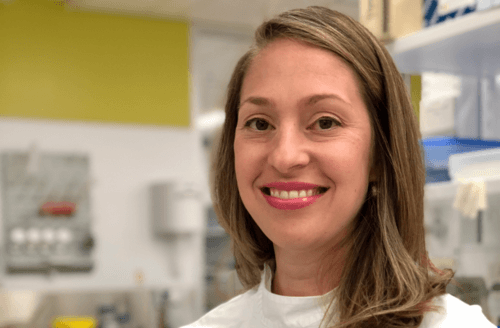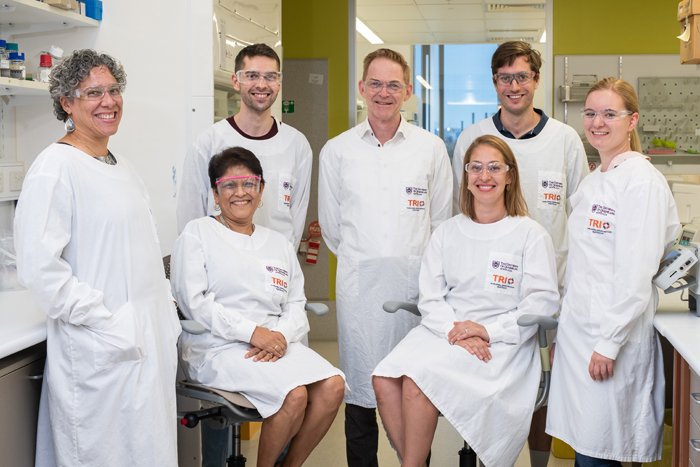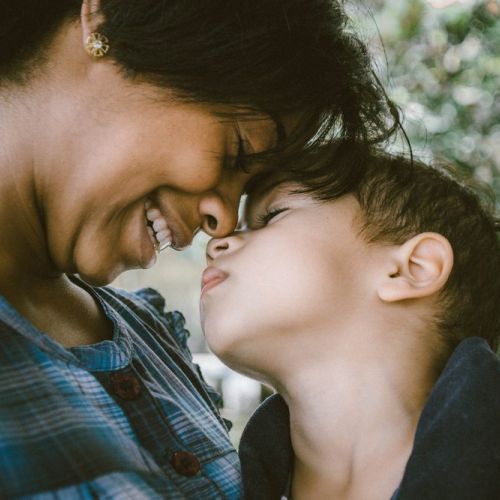By Emily Usher
We talk to Cure Cancer grant recipient Dr Lauren Aoude to learn more about oesophageal adenocarcinoma, her work in this space, and the exciting breakthroughs that collaborations with other researchers make possible.

First things first - what exactly is Oesophageal Adenocarcinoma?
“The oesophagus is often referred to as the ‘food pipe'” explains two-time Cure Cancer grant recipient, Dr Lauren Aoude. “It’s a muscular tube in the digestive system, connecting the mouth to the stomach. You may have also heard it referred to as the gastro-intestinal tract.”
“Oesophageal adenocarcinoma is a type of oesophageal cancer that usually arises from the glandular cells which line the lower part of the tract.”
Lauren’s Research Project

Dr Lauren, who is a UQ Amplify Fellow in the Surgical Oncology Group at The University of Queensland Frazer Institute, is currently working on understanding who is most likely to develop this form of the disease by looking at inherited defects in DNA.
“The incidence of OAC in Australia has more than doubled in the past three decades, but with few treatment options currently available, the outlook for patients is poor,” explains Dr Lauren. “We know that up to 10% of all cancers are caused by inherited (germline) mutations that increase disease risk, but very little is known about high-risk genes involved in OAC susceptibility as it is an understudied cancer. My current project examines genes that are involved in DNA repair and looks at whether variants in these genes might increase a person’s risk of OAC. Ultimately, this would allow clinicians to have a better understanding of who is most at risk of developing OAC; improve screening and early detection; better predict treatment responses; and improve outcomes for patients.”
Dr Lauren’s research group recently led a national study that used genome sequencing to provide an improved understanding of why some patients respond to treatments like chemotherapy, and others do not. The study was particularly important as many oesophageal adenocarcinoma patients receive therapy that provides no survival benefit but causes serious side effects and reduced quality of life. Predicting which patients will respond to therapy is a major challenge to successful treatment and the overarching goal of Lauren’s research program.
The study, which has recently been accepted for publication in Nature Communications, was the result of a collaboration with other researchers, including past Cure Cancer grant recipients, Dr Marjan Mojtabavi Naeini and Dr Sandra Brosda.
The Importance of Collaboration

“Lauren and I work very closely together on various projects, including the OAC projects,” says Sandra, who is also based at the UQ Frazer Institute. “Combining Lauren’s biology and my bioinformatics background has already led to several great research outcomes and publications. As a bioinformatician, it’s very important for me to work closely with biologists to ensure the computational results are valid biological results. These diverse, complementary skill sets enable us to quickly adapt to and apply new emerging technologies.”
“OAC is still a very understudied and complex disease so breakthrough events are rare,” says Dr Lauren. “However, collaboration with other scientists helps us to further our understanding and gives us the best chance of more positive outcomes for patients. It’s wonderful to be able to share passion and knowledge with others in the field of OAC. By doing this, both researchers and patients can benefit from the work we are doing.”
Having supported groundbreaking research for the past 56 years, Cure Cancer recognises the importance of scientific collaboration and the ways in which this can advance our understanding of cancer in all its guises. That’s why we ensure our support goes beyond funding, helping emerging researchers to thrive by providing collaborative symposiums and networking opportunities that allow our grant recipients to share and further extend their brilliant thinking.
“Collaboration plays an important role in research because different skill sets are required to solve complex problems like cancer,” continues Sandra. “One person alone will not solve the puzzle. However, if you combine multiple minds with different skill sets, the pieces will come together and reveal the hidden picture.”

Pictured: Dr Lauren Aoude with Dr Sandra Brosda (far right).
In Australia, gastrointestinal cancers like oesophageal cancer contribute to a significant proportion of illness and death, accounting for 21% of all cancers diagnosed and 28% of all cancer deaths.
2018 saw around 28,900 diagnoses and around 13,800 deaths from gastrointestinal cancers.
As the most commonly diagnosed gastrointestinal cancer, bowel cancer, in particular, is the most third most commonly diagnosed cancer and the second most common cancer-related cause of death in Australia.
Supporting cancer research is key to finding better ways to prevent, diagnose and treat gastrointestinal cancers, and ultimately improve patient outcomes.










